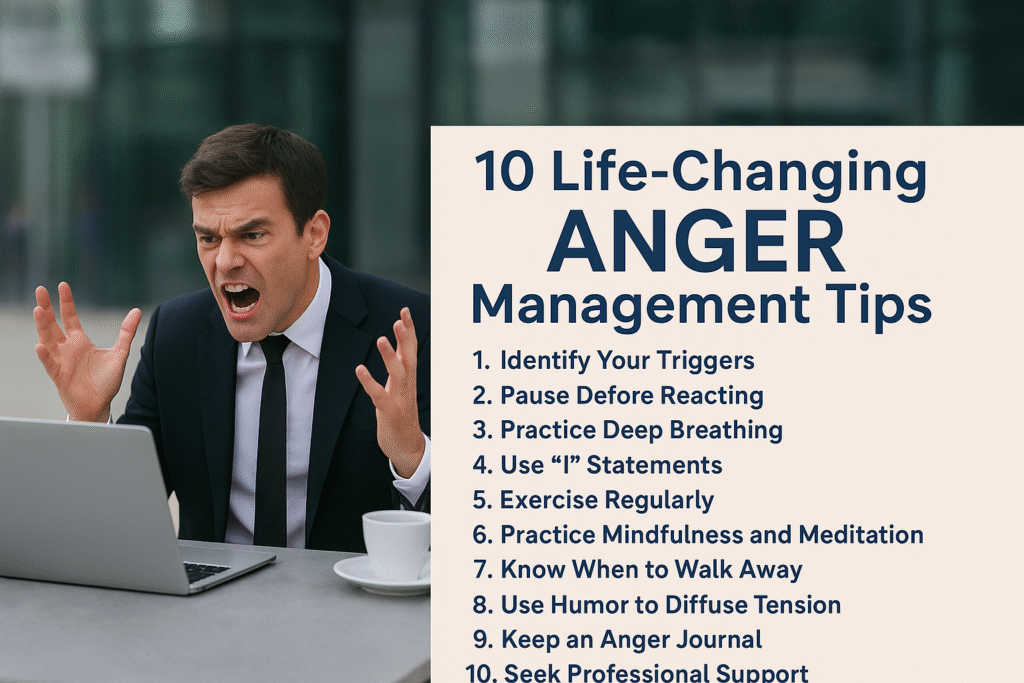Introduction:
Every person on Earth experiences anger as a basic human feeling which arises when they sense danger or experience obstacles or witness unfair situations. The way we choose to express anger determines whether it will create destructive outcomes or become a source of empowerment. The American Psychological Association (APA, 2023) states that anger itself does not create harm but uncontrolled anger produces lasting effects which include elevated blood pressure and heart disease and damaged interpersonal bonds. The Harvard Medical School (2022) research demonstrates that ongoing anger disrupts emotional control while simultaneously damaging the immune system and elevating stress hormones including cortisol.
The fast-paced nature of modern life together with work-related stress and relationship demands and technological overload has made anger a common emotional obstacle for people today. A 2018 Journal of Behavioral Medicine study demonstrated that people who practiced anger-management techniques including mindfulness and cognitive reframing and relaxation exercises showed major decreases in stress while their overall health improved.
The goal of effective anger management involves learning to understand and process anger while finding appropriate ways to express it in a controlled fashion. The practice helps you develop the ability to stop and think before you act on impulse. Learning emotional mastery will help you safeguard your mental health while building stronger relationships and keeping your professional composure intact.
In this blog, you’ll discover 10 practical and research-backed anger management tips designed to help you stay calm, regain emotional control, and channel your energy into productive action. Whether you face daily irritations, workplace frustrations, or deep-rooted anger issues, these strategies can help you transform emotional turbulence into inner strength.

Useful Anger Management Tips
1. Identify Your Triggers
One of the most effective anger management tips is learning what sets you off. Keep a journal or make a mental note of situations, people, or words that cause you to feel angry. Understanding your triggers is the first step toward managing your emotional responses. The earlier you notice the signs, the easier it is to calm down. Triggers often lead to sudden outbursts. If you know about them, you’re less likely to be surprised and more likely to stay calm. When you can clearly see patterns, you can start working on the deeper issues, like building self-confidence.
2. Pause Before Reacting
When you’re angry, it’s easy to act without thinking. Instead, stop for a moment, count to ten or step away for a situation. This small break gives your brain time to switch from emotional to rational thinking. This is a simple but powerful anger management tip. Moreover, taking a pause helps you respond instead of react. It shows self-control, even if you’re still upset inside. Pausing gives you power. It turns angry impulses into smart choices and helps protect your relationships, your peace of mind, and your goals. In addition, pausing may help you to not make a bad decision.
3. Practice Deep Breathing
Practice Deep Breathing” is a simple but highly effective anger management technique. It helps calm your body and mind so you can think more clearly and stay in control when you’re feeling angry. Anger can make your mind race. Deep breathing gives your brain a moment to pause, clear the fog, and think before reacting. When you’re breathing slowly and deeply, you’re less likely to lash out or say something you’ll regret. It gives you space to choose how to respond. Deep breathing helps you stay calm, clear and in control. It’s like hitting the “reset” button for your emotions.
4. Use “I” Statements
Instead of blaming others (“You never listen to me!”), express how you feel using “I” statements (“I feel hurt when I’m not heard.”). This is one of the most important anger management tips for improving communication and reducing conflict. “I” statements help you communicate clearly and respectfully. Saying “I feel…” or “I need…” shows that you are taking ownership of your emotions, not blaming others for how you feel. This promotes self-awareness and emotional maturity which are key components of anger control. “I” statements help keep conversations focused on solving the problem, not escalating it. It shifts the tone from conflict to collaboration, allowing for more productive outcomes.
5. Exercise Regularly
Physical activity helps release built-up tension and stress. Whether it’s walking, running, or yoga, moving your body can dramatically improve your mood. It’s one of the most overlooked yet effective anger management tips for maintaining long-term emotional balance. Regular exercise can boost confidence and self-worth. When you feel better about yourself, you’re less likely to respond to situations with anger. Exercise is not just a physical activity, it’s a powerful emotional regulation tool. By regularly working out, you build physical and mental resilience, making it easier to manage anger constructively.
6. Practice Mindfulness and Meditation
Mindfulness helps you stay grounded in the present moment. By observing your thoughts, you can catch anger before it controls you. Meditation and mindfulness encourage a pause between what triggers your anger and your response. This gap gives you the chance to choose a more constructive reaction instead of an automatic angry outburst.
Regular mindfulness practice lowers stress levels and calms the nervous system, making you less prone to emotional spikes like anger. By training your mind to stay focused, mindfulness strengthens your patience. You become better at handling frustrating situations without losing your temper.
7. Know When to Walk Away
Sometimes, the healthiest thing you can do is leave the situation either temporarily or permanently. Walking away gives you time to cool down and evaluate your next move. It’s a practical anger management tip that can save relationships and reputations. Walking away, when necessary, shows that you respect yourself and the situation enough to avoid letting anger take over. It also sets an example for others on managing conflict in a mature and controlled way. A temporary break gives you the chance to ask yourself:
- Why am I angry?
- Is this worth getting upset over?
- How can I address this calmly?
This reflection helps you return to the situation with a more balanced perspective. Knowing when to walk away is not avoidance, it’s a smart step in anger management. It empowers you to stay in control and return to the situation with a clearer and calmer mindset.
8. Use Humor to Diffuse Tension
Humor, when used appropriately, can shift your perspective and relieve tension. Laughing at minor irritations can prevent them from escalating into major blow-ups. Using humor to diffuse tension is a powerful strategy in anger management because it shifts the emotional tone of a situation and creates psychological distance from the source of anger. Anger often escalates through a cycle of reactive thoughts and behaviors. Humor interrupts this by changing the emotional narrative. Humor encourages people to view the situation from a different, often less threatening perspective.
9. Keep an Anger Journal
Keeping an anger journal is a highly effective tool in anger management because it helps individuals become more self-aware and develop healthier responses over time. Writing about your anger helps you explore what triggered it and how you felt afterwards. This reflection helps you understand the root causes of your anger, not just what happened on the surface.
An anger journal helps you see how your reactions are changing over time. You can note improvements, such as quicker recovery after getting angry, which boosts confidence. Journaling often reveals underlying issues that need to be addressed such as unmet needs, stress, or boundary violations. With that clarity, you can shift from reacting with anger to solving the problem calmly.
10. Seek Professional Support
Seeking professional support such as working with a counselor or anger management specialist can be a crucial step in managing anger effectively. If your anger feels out of control or causes harm then professional guidance is essential. Professionals help you explore deep-rooted emotions or past experiences like anxiety or depression that may be fueling your anger. They can uncover patterns you’re unaware of and help address the true source of your emotional reactions.
Talking to a professional offers a confidential setting where you can express anger safely without fear of consequences. This can be especially valuable if you’re used to suppressing your anger in harmful ways. Anger management isn’t just about quick fixes; it’s about building emotional resilience and better relationships. Professionals guide you through that process over time, adapting strategies to your specific needs.
Conclusion
Anger functions as a warning system which delivers important messages about your internal state and external environment. The message from anger indicates that you need to address either an internal issue or an external situation. These 10 anger-management strategies enable you to receive the message without allowing anger to control your actions. Emotional control exists on a spectrum of progress rather than perfection because it requires both awareness and personal development.
Regular practice of mindfulness and self-reflection combined with positive coping strategies will help you observe significant changes in your ability to handle difficult situations. Your ability to think clearly and communicate better will improve while you stay calm during stressful situations. The Stanford Center for Compassion and Altruism Research (2021) explains that emotional mastery leads to better personal health while building stronger relationships with others.
When anger emerges take a deep breath and pause to remember that you maintain control over your emotions rather than letting anger take over. Through patience and self-awareness you can transform this intense feeling into a power that builds your inner strength and emotional serenity.
References
https://www.verywellmind.com/anger-management-strategies-4178870
https://www.mayoclinic.org/healthy-lifestyle/adult-health/in-depth/anger-management/art-20045434
https://www.healthline.com/health/mental-health/how-to-control-anger
FAQs
What causes anger management difficulties?
Other mental health issues or low self-esteem can also contribute to difficulties dealing with anger (Prior, 2020). Our skills in managing and expressing anger also vary. Some people struggle to deal with anger in the moment and may not be able to calm themselves down.
What are anger management coping skills?
These are practical skills and things you can do when you feel angry. Anger management skills include: Changing the way you think about situations. Your healthcare provider may call this cognitive restructuring. Instead of dwelling on or exaggerating negative emotions, you will learn to change your perspective.



Good work sir, keep it up 👍☺
Thank you for your sharing. I am worried that I lack creative ideas. It is your article that makes me full of hope. Thank you. But, I have a question, can you help me? https://www.binance.info/zh-CN/register?ref=WFZUU6SI
Your article helped me a lot, is there any more related content? Thanks!
Your article helped me a lot, is there any more related content? Thanks!